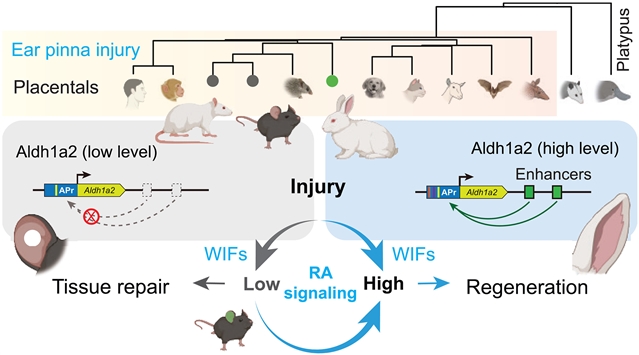
研究人员对耳廓损伤后恢复的家兔和小鼠进行了单细胞和空间转录组分析。视黄酸(RA)的产生不足,由限速酶Aldh1a2的缺乏引起,促进了RA的降解,是小鼠耳廓再生失败的原因。开启Aldh1a2或补充RA可重新激活再生。多种Aldh1a2相关调控元件的进化失活是小鼠和大鼠损伤后Aldh1a2表达不足的原因。
此外,一个增强子激活Aldh1a2足以改善转基因小鼠的耳廓再生。他们的研究发现了一个与再生进化有关的基因开关。
据悉,哺乳动物在受损耳廓再生能力方面表现出显著的多样性,但导致再生失败的遗传变化仍然是未知的。
附:英文原文
Title: Reactivation of mammalian regeneration by turning on an evolutionarily disabled genetic switch
Author: Weifeng Lin, Xiaohui Jia, Xiaofeng Shi, Qiuya He, Panyu Zhang, Xianglei Zhang, Liping Zhang, Mingqi Wu, Tengfei Ren, Yufei Liu, Haohao Deng, Yanyao Li, Shiqi Liu, Shaoyong Huang, Jingmin Kang, Jun Luo, Ziqing Deng, Wei Wang
Issue&Volume: 2025-06-26
Abstract: Mammals display prominent diversity in the ability to regenerate damaged ear pinna, but the genetic changes underlying the failure of regeneration remain elusive. We performed comparative single-cell and spatial transcriptomic analyses of rabbits and mice recovering from pinna damage. Insufficient retinoic acid (RA) production, caused by the deficiency of rate-limiting enzyme Aldh1a2 and boosted RA degradation, was responsible for the failure of mouse pinna regeneration. Switching on Aldh1a2 or RA supplementation reactivated regeneration. Evolutionary inactivation of multiple Aldh1a2-linked regulatory elements accounted for the deficient Aldh1a2 expression upon injury in mice and rats. Furthermore, the activation of Aldh1a2 by a single rabbit enhancer was sufficient to improve ear pinna regeneration in transgenic mice. Our study identified a genetic switch involved in the evolution of regeneration.
DOI: adp0176
Source: https://www.science.org/doi/10.1126/science.adp0176
